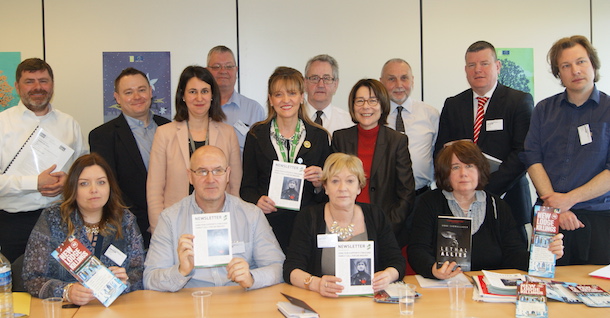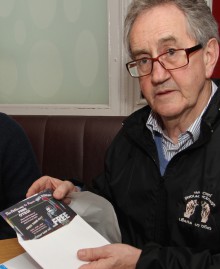15 April 2016
Nearly 20 years after Good Friday Agreement, political ex-prisoners still suffer discrimination, says MEP

● Main picture: Martina Anderson MEP with representatives from the office of European Human Rights Commissioner Nils Muižnieks and a delegation of victims and families of British state collusion during a recent trip to Strasbourg – the delegation included representatives from the Pat Finucane Centre, Committee on the Administration of Justice, Relatives for Justice, Coiste na nIarchimí, Victims & Survivors Forum, and Sinn Féin
THE DIRECTOR of republican ex-prisoners' organisation Coiste na nIarchimí has been joined by Sinn Féin MEP Martina Anderson in a call at the European Parliament this week for the full implementation of the Good Friday and subsequent agreements in terms of equality for ex-political prisoners who have been crucial to the Peace Process.
The pair were speaking as a delegation of victims and families of British state collusion visited the European Parliament in Strasbourg to press their cases and meet EU officials and MEPs concerned about human rights and civil liberties. The group included Michael Culbert, head of Coiste na nIarchimí (pictured).
Martina Anderson, a former political prisoner herself, said:
“Despite the United Nations outlining that their process of DDR (disarmament, demobilisation and reintegration) must be integrated into the entire peace process of post-conflict societies, this was never carried out in Ireland.
“As a result, almost 20 years after the Good Friday Agreement, certain groups of Irish citizens – namely ex-political prisoners and their families – are still experiencing discrimination.”

The UN states that whilst DDR alone cannot resolve conflict, prevent violence, or enable development, it can, however, help establish a secure environment so that other elements of a recovery and peace-building strategy can proceed, the Irish MEP said.
She said that although our society, along with the help of political parties, has managed to resolve conflict and prevent violence, “many of our citizens are still denied full access to goods and services”, including employment, where applicants can be denied or dismissed from jobs if they are an ex-political prisoner.
Representatives from Coiste na nIarchimí presented a short analysis of the current situation, explaining the inequalities and requesting advocacy to the Office of the European Human Rights Commissioner and to the Office of the Execution of Judgements.
Martina Anderson concluded:
“Former political prisoners are entitled to be treated with respect as full and equal members of society and the progressive steps made during the meetings with EU representatives are further steps into ending this discrimination.”
Follow us on Facebook
An Phoblacht on Twitter
Uncomfortable Conversations

An initiative for dialogue
for reconciliation
— — — — — — —
Contributions from key figures in the churches, academia and wider civic society as well as senior republican figures






